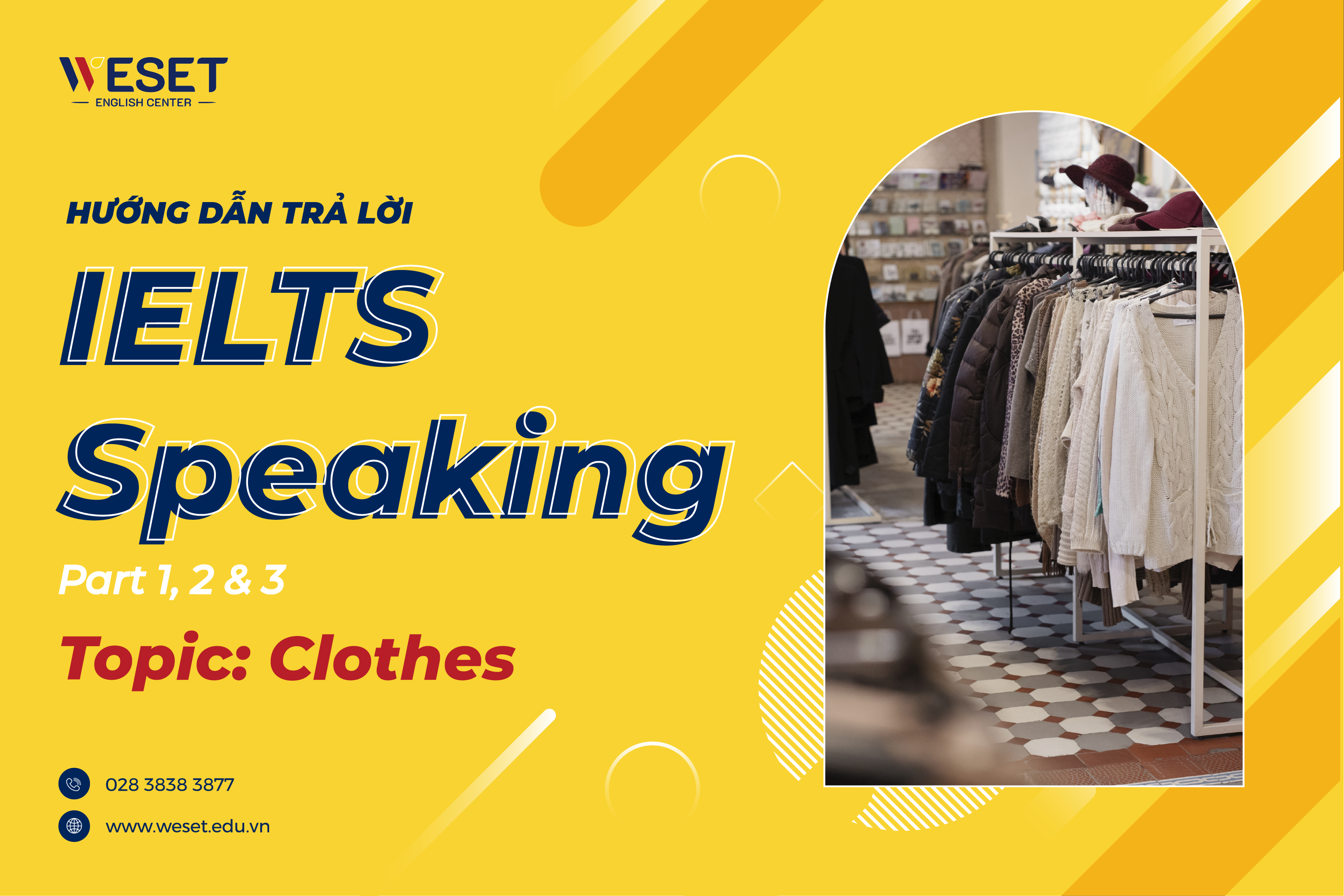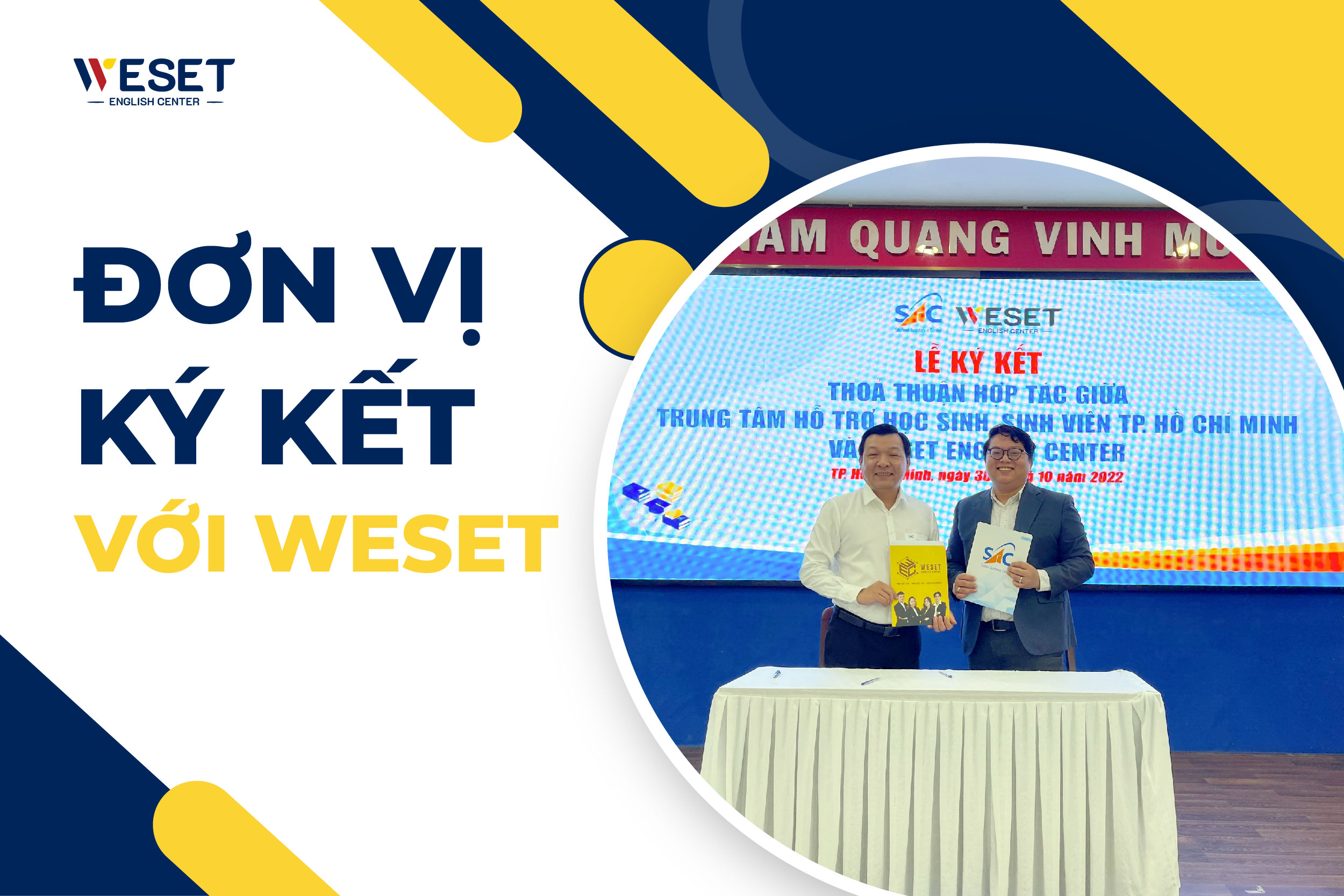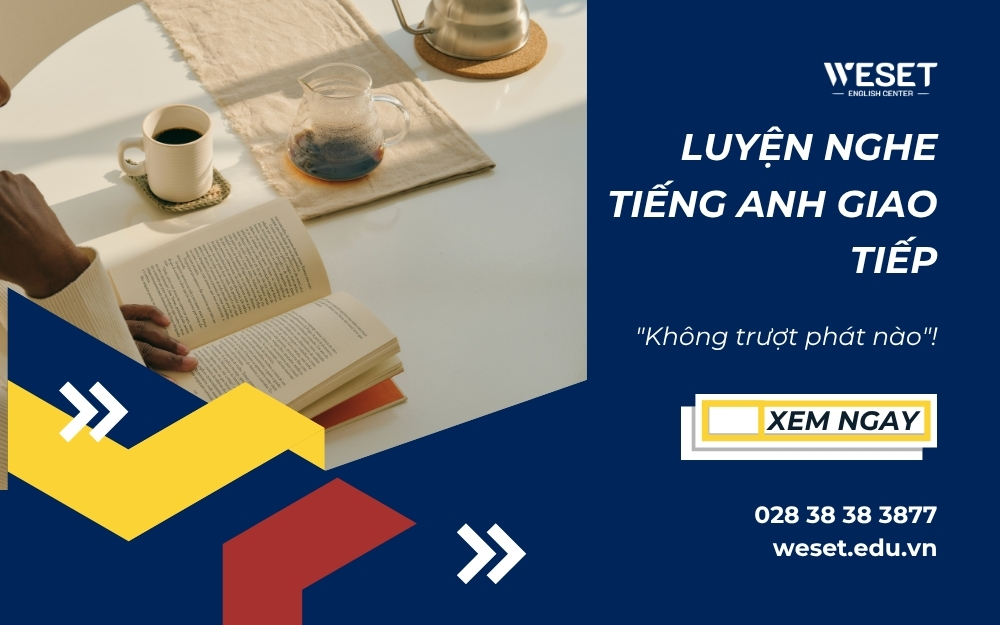Trang chủ Blog Bài thi IELTS mẫu IELTS Speaking Clothes – Sample Part 1, 2 & 3
IELTS Speaking Clothes – Sample Part 1, 2 & 3
- Jonathan M. Pham
- Bài mẫu IELTS Sample Speaking, Bài thi IELTS mẫu
MỤC LỤC
Hôm nay, trở lại với series bài mẫu theo chủ đề Speaking, hãy cùng WESET khám phá topic IELTS Speaking Clothes – qua việc nghiên cứu bộ câu trả lời mẫu & từ vựng liên quan hữu ích bạn nhé!
IELTS Speaking Clothes – Part 1
Q1: Do you enjoy shopping for clothes?
Model Answer: Yes, I do enjoy shopping for clothes. It gives me a chance to explore different styles and trends, and I find it quite relaxing. I believe clothes not only reflect our personality but also boost our confidence. So, shopping for clothes is always a fun and fulfilling experience for me.
Q2: What type of clothes do you like to wear?
Model Answer: I prefer to wear comfortable yet stylish clothes. Casual wear, such as jeans and t-shirts, are my go-to outfits for everyday activities. However, I also like to dress up on special occasions, so I have a collection of semi-formal and formal attire in my wardrobe as well.
Q3: How often do you buy new clothes?
Model Answer: I don’t buy new clothes very frequently. I believe in sustainable fashion, so I try to make thoughtful purchases and invest in quality clothing that can last for a long time. I generally buy new clothes only when I need to replace old ones or when there’s a special event coming up.
Q4: Are there any traditional clothes in your country that you like?
Model Answer: Yes, in my country, we have some beautiful traditional attire that I absolutely adore. The vibrant colors and intricate designs of our traditional dresses fascinate me. One of my favorites is the “sari,” a graceful and elegant outfit worn by women on various occasions.
Q5: How do you feel when you wear formal clothes?
Model Answer: When I wear formal clothes, I feel more confident and presentable. Formal attire gives me a sense of professionalism and helps me make a positive impression, especially during job interviews or important meetings. It’s incredible how the right outfit can change one’s demeanor and attitude.
Q6: Do you prefer to shop for clothes online or in physical stores?
Model Answer: I enjoy both online and physical shopping experiences, but if I have to choose, I’d say I prefer physical stores. There’s something special about browsing through racks of clothes, trying them on, and feeling the fabric before making a purchase. Moreover, being able to interact with store staff and get their opinions adds a personal touch to the shopping process.
Q7: Do you think the clothes we wear can reflect our personality?
Model Answer: Absolutely! I firmly believe that our choice of clothing reflects our personality and individuality. The colors, styles, and overall fashion sense we adopt can give others a glimpse of our tastes, interests, and even our confidence level. Our clothes are a form of self-expression, and they play a significant role in how others perceive us.
IELTS Speaking Clothes – Part 2
Describe a memorable outfit you wore on a special occasion. You should say:
- What was the occasion?
- When and where did it take place?
- Describe the outfit itself, and
- Explain why this outfit was memorable for you.
Model Answer:
Sure, I’d love to share a memorable outfit I wore on a special occasion. It was during my college graduation ceremony, a significant milestone in my life. The graduation took place in the grand auditorium of our university, and it was a momentous day filled with joy and pride.
For the event, I had carefully chosen a traditional outfit from my cultural heritage. It was a stunning “sherwani,” a regal and ornate Indian attire typically worn by men on formal occasions. The sherwani was made of rich, deep blue velvet fabric with intricate gold embroidery adorning the front and sleeves. Paired with it was a cream-colored “kurta” (a long tunic) and “churidar” (tightly fitted trousers). I completed the look with matching golden “jutis” (traditional shoes) and a classic turban.
This outfit was truly memorable for me for several reasons. Firstly, it represented a strong connection to my cultural roots, which I wanted to honor and celebrate on such a momentous day. Secondly, the sherwani was a family heirloom, passed down from my grandfather, who had also worn it on his graduation day many decades ago. It held immense sentimental value, and wearing it made me feel a deep sense of pride and connection to my family’s heritage.
Moreover, the sherwani stood out among the sea of graduation gowns and suits that were typically worn by graduates, making me feel unique and distinctive. Many of my friends and professors complimented the outfit, and it sparked conversations about the significance of cultural clothing during the post-ceremony celebrations.
Overall, the outfit not only made me feel confident and proud as I walked across the stage to receive my degree, but it also created lasting memories of the event. It was a beautiful fusion of tradition, sentimentality, and personal style, making my college graduation even more special and unforgettable.
IELTS Speaking Clothes – Part 3
Q1: How do you think the clothes we wear influence our behavior and emotions?
Model Answer: The clothes we wear can significantly impact our behavior and emotions. When we dress in comfortable and well-fitting clothes, we tend to feel more at ease and confident, which can positively affect our behavior. On the other hand, wearing formal or professional attire may make us feel more serious and focused, altering our behavior accordingly. Similarly, certain colors and styles can evoke specific emotions. For instance, bright colors might uplift our mood, while darker shades can create a more subdued atmosphere.
Q2: In what ways has fashion changed in your country over the years?
Model Answer: Fashion in my country has undergone remarkable changes over the years. In the past, traditional clothing was prevalent and deeply rooted in our culture. However, with globalization and exposure to international trends, there has been a gradual shift towards more westernized and contemporary fashion. People now experiment with various styles, and there’s a greater acceptance of diverse fashion choices. Additionally, sustainable and eco-friendly fashion has gained traction, indicating a growing awareness of environmental issues in the fashion industry.
Q3: Why do some people prefer brand-name clothes over non-brand ones?
Model Answer: The preference for brand-name clothes can stem from various factors. Firstly, some people associate well-known brands with higher quality and better craftsmanship, which may justify the higher price tags. Secondly, brand names often carry a certain social status or prestige, and wearing such clothes can make individuals feel more confident and socially accepted. Additionally, brand loyalty and advertisement influence people’s choices, as they might identify with a brand’s values or image.
Q4: Do you think people’s choice of clothing is influenced more by fashion trends or personal comfort?
Model Answer: It depends on the individual and the context. Some people are highly fashion-conscious and prioritize following the latest trends, even if it means sacrificing some comfort. On the other hand, many others prioritize personal comfort and prefer clothing that allows them to move freely and feel at ease throughout the day. However, there’s a growing trend towards blending fashion with comfort, as designers focus on creating stylish yet comfortable clothing options.
Q5: How can the fashion industry become more sustainable?
Model Answer: To become more sustainable, the fashion industry can take several steps. Firstly, it can promote ethical and eco-friendly practices by using sustainable materials, reducing waste, and adopting responsible production methods. Fashion brands can also encourage consumers to buy less and invest in high-quality, durable clothing that lasts longer. Furthermore, educating consumers about the environmental impact of fast fashion and encouraging them to support eco-conscious brands can play a significant role in making the industry more sustainable.
Q6: In what ways do you think clothing choices differ between younger and older generations?
Model Answer: Younger generations often tend to embrace more contemporary and trendier styles, influenced by social media, celebrities, and pop culture. They might experiment with bold colors, unconventional cuts, and unique accessories to express their individuality. In contrast, older generations might lean towards classic and timeless fashion choices, valuing comfort and functionality. However, these differences are not absolute, as fashion preferences can vary widely within each age group based on personal tastes and cultural influences.
Từ vựng IELTS Speaking Clothes Vocabulary
| English | Vietnamese |
|---|---|
| Clothes | Quần áo |
| Outfit | Trang phục |
| Traditional clothes | Trang phục truyền thống |
| Formal attire | Trang phục trang trọng |
| Casual wear | Trang phục thông thường |
| Fashion trends | Xu hướng thời trang |
| Brand-name clothes | Quần áo của các thương hiệu nổi tiếng |
| Sustainable fashion | Thời trang bền vững |
| Comfortable | Thoải mái |
| Stylish | Hợp thời trang |
| Trendy | Theo xu hướng |
| Sentimental value | Giá trị tình cảm |
| Formal ceremony | Buổi lễ trang trọng |
| Occasion | Dịp, sự kiện |
| Globalization | Toàn cầu hóa |
| Westernized fashion | Thời trang phương Tây |
| Prestige | Uy tín, thanh thế |
| Social status | Địa vị xã hội |
| Comfortability | Sự thoải mái |
| Eco-friendly | Thân thiện môi trường |
| Sustainable materials | Vật liệu bền vững |
| Responsible production | Sản xuất có trách nhiệm |
| Fast fashion | Thời trang nhanh |
| Classic | Cổ điển |
| Timeless | Vượt thời gian |
| Individuality | Tính cá nhân |
| Pop culture | Văn hóa đại chúng |
| Bold colors | Màu sắc nổi bật |
| Unconventional cuts | Các cắt may không thông thường |
| Accessories | Phụ kiện |
| Ethical practices | Thực hành đạo đức |
| Durable | Bền bỉ, lâu bền |
| Contemporary | Đương đại |
Lời kết
Trên đây là gợi ý trả lời mẫu và từ vựng chủ đề IELTS Speaking Clothes. Hãy dành thời gian luyện tập thường xuyên để tăng cường vốn từ và phản xạ hơn mỗi ngày – cũng như đừng quên xem qua thư viện bài mẫu IELTS của WESET và đăng ký nhận bản tin để nhận các bài viết về mẹo học tiếng Anh mới nhất từ trung tâm bạn nhé!
Sample Speaking theo các chủ đề khác:







